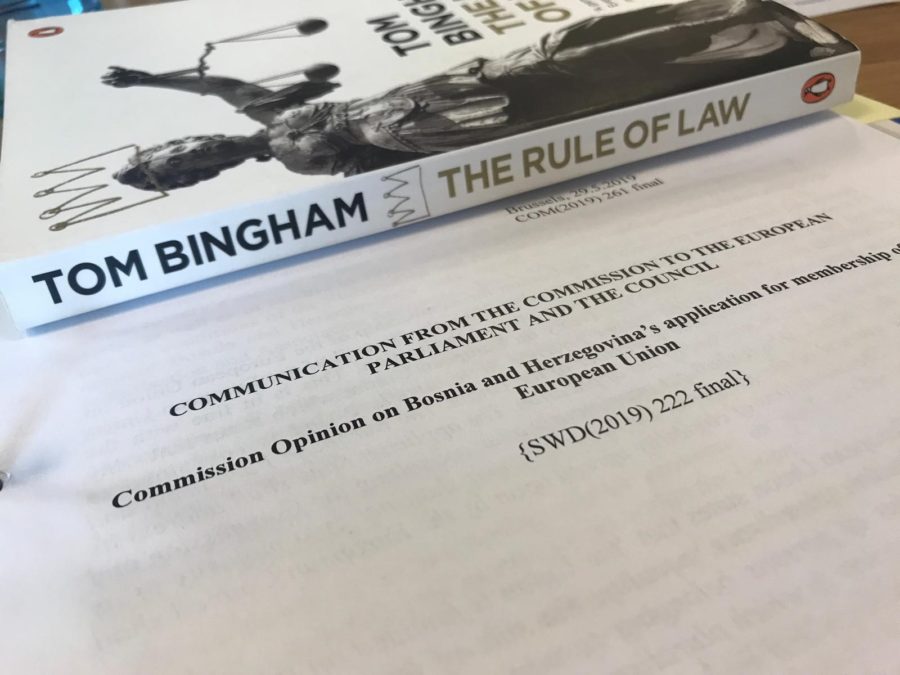26th June 2019
I Fought The Rule of Law, and The Rule of Law Won*

The rule of law. It’s a phrase I hear almost every day. I probably use it as often. It is the basis of complaints from citizens, accusations between politicians, and criticisms from civil society. It is at the heart of the European Commission’s recent ‘Opinion’ on BiH. I am not sure we know what we mean we use it, and I am sure we do not always agree. But I am sure that it matters. As English philosopher John Locke put it more than three hundred years ago, ‘Wherever law ends, tyranny begins’.
There are many more qualified minds than mine, legal experts, who can elaborate the traditions and histories of the concept. For me, much of this can be reduced to a relatively simple concept: no one is above the law. The same rules should apply, regardless of position, influence or wealth.
And I think this concept goes a long way to identify what people are most often frustrated or angry about when they say the rule of law is missing, or falling short. When someone is able to avoid responsibility, because of who they know, or who they are, this offends our most fundamental sense of justice. If someone can commit a crime, abuse their position, or fail to do their job, and there are no consequences for them, what is our incentive for playing by the rules ourselves?
When I talk to citizens of this country about what they would like to see change, or why in increasing numbers they are thinking about leaving, I keep hearing terms like fairness and dignity. This is not abstract. Fairness means not having to join a political party to get a chance to work in the public administration, when you are the best candidate. It means not having to pay a bribe or risk your small business being swamped in ‘inspections’ or trumped up court cases. It means public contracts are decided on value for money, not connections. Dignity means receiving medical treatment to which you or your family are entitled, without having to provide ‘gifts’, or exchange favours. It means knowing that the education qualifications you studied so hard for cannot simply be bought or faked.
All of these are questions of the rule of law. It is much more than the court system – though that is a crucial and very visible part. It is about the consistent application of known rules in everyday life. And it is about the spirit and principles behind those rules, not only the lowest possible standard you can get away with. This is especially important for public officials, who should set the example for all, and be open to these checks. Independence does not mean being above scrutiny.
So what can we do? There are many excellent individuals and organisations working to shine a light on these issues, all deserving of our support. Corruption hates transparency, and the more people can share and draw attention to these practices the better. Citizens can and should expect better from those they elect, and those they fund through their taxes.
In addition to this bottom-up pressure, there needs to be support from others. In its increased funding for BiH, the UK has put rule of law issues right at the centre, including professionalization of judges and prosecutors, clear conflict of interest rules, transparent public financing, protection of whistle blowers and journalists, more efficient courts, better police coordination, reduced administration burdens for business and individuals, de-politicisation of publicly-owned companies, and effective measures against discrimination.
I also strongly welcome the EU Opinion’s clear focus on rule of law issues, as necessary for moving ahead on the EU path and improving lives in BiH today. Examples include
- Track records of proactive investigations, indictments, prosecutions and convictions in corruption cases
- Transparency in privatisation processes
- Effective cooperation among law enforcement bodies
- Independent judiciary and High Judicial and Prosecutorial Council
- Equality and non-discrimination of citizens, and the protection of vulnerable groups
- Professional and de-politicised civil service
- Freedom of expression and of the media and the protection of journalists
Public confidence in the rule of law begins as soon as elections are announced, and I was pleased to see the Opinion highlight continued failures to improve the electoral system in BiH, including the lack of elections in Mostar for the last 11 years. This is not normal. And far from the standards expected from any democratic country.
Which brings me back to the idea that no-one is above the law. More than anything else, this is the test of whether any country is moving in the right direction. The UK and other friends stand ready to help achieve it. Its citizens want it. And it matters to all of us.
*With thanks to The Clash
Do you feel any responsibility for the state in which BiH is?